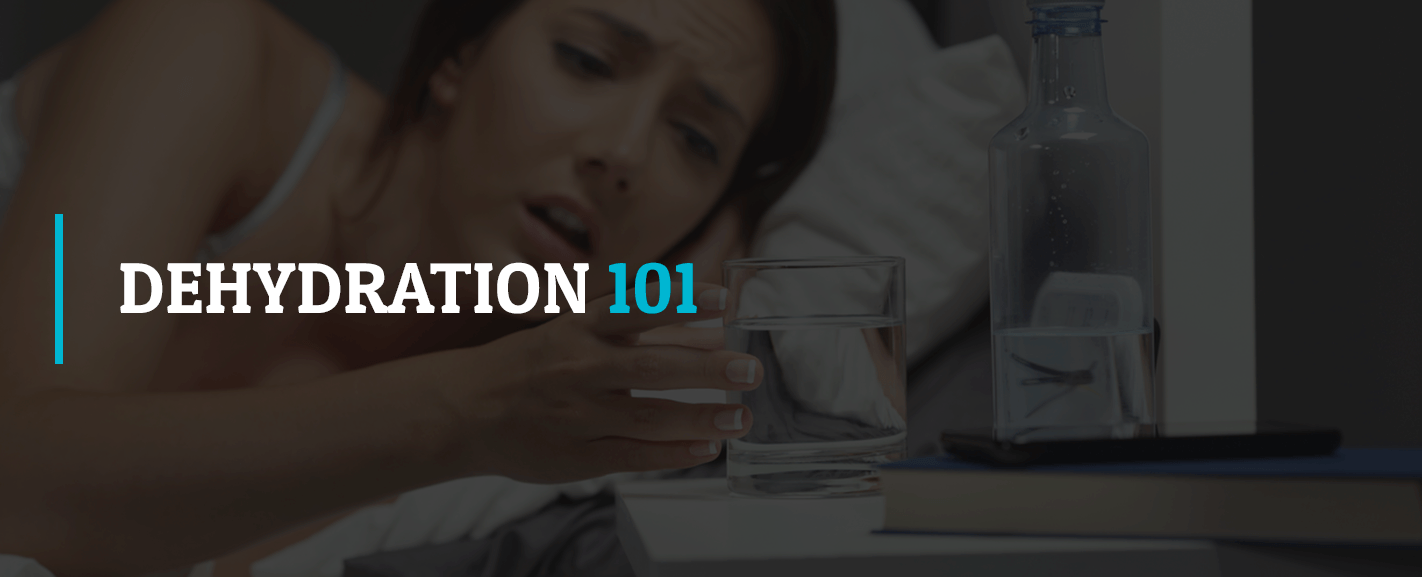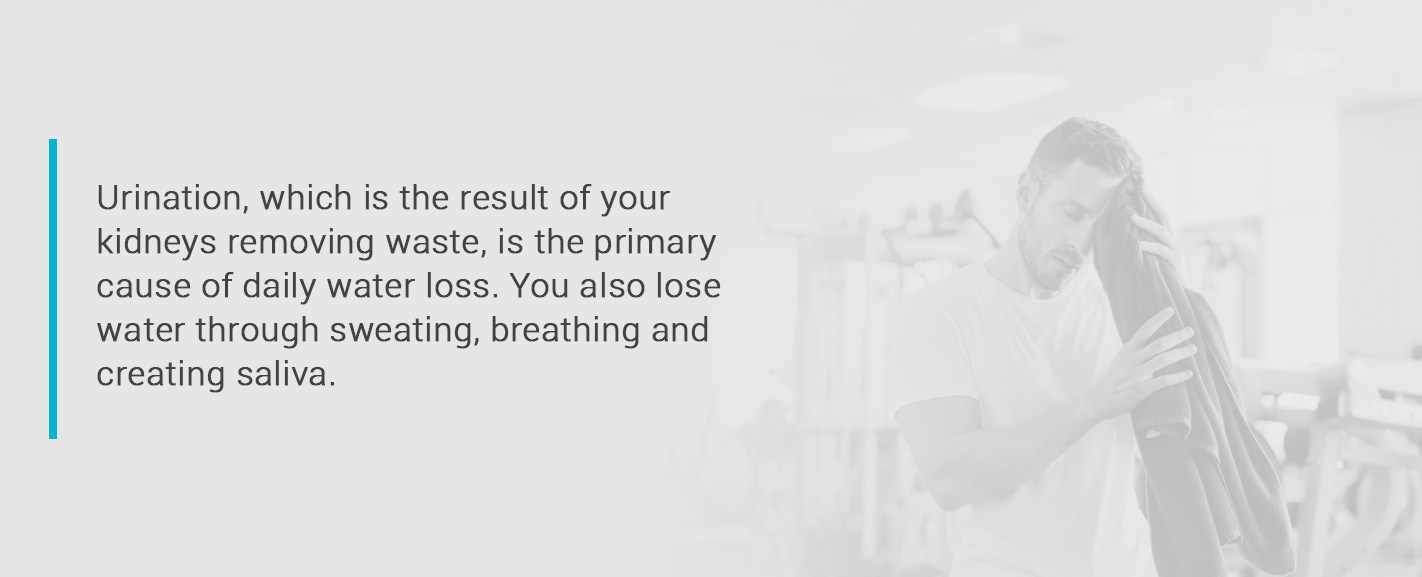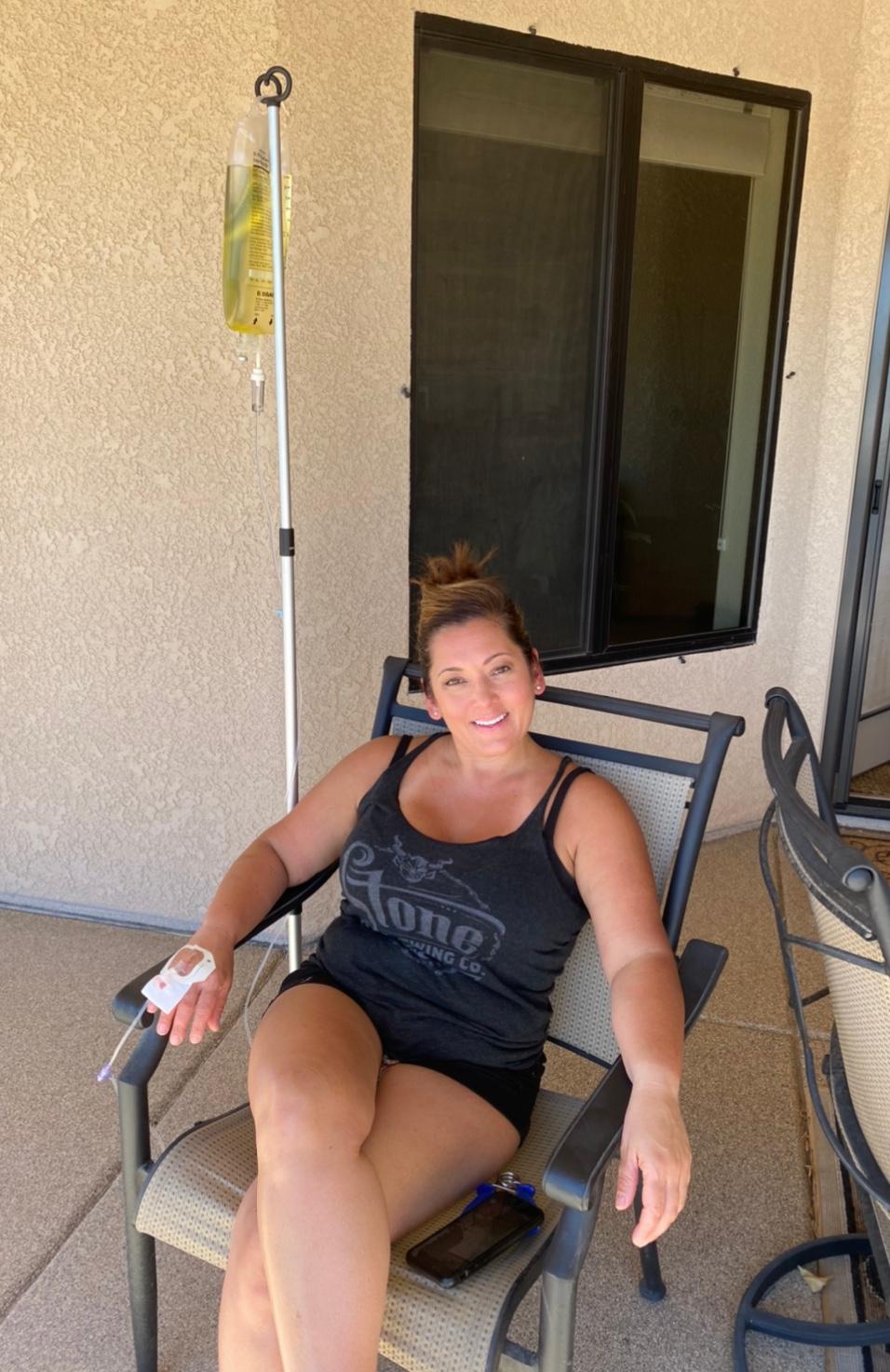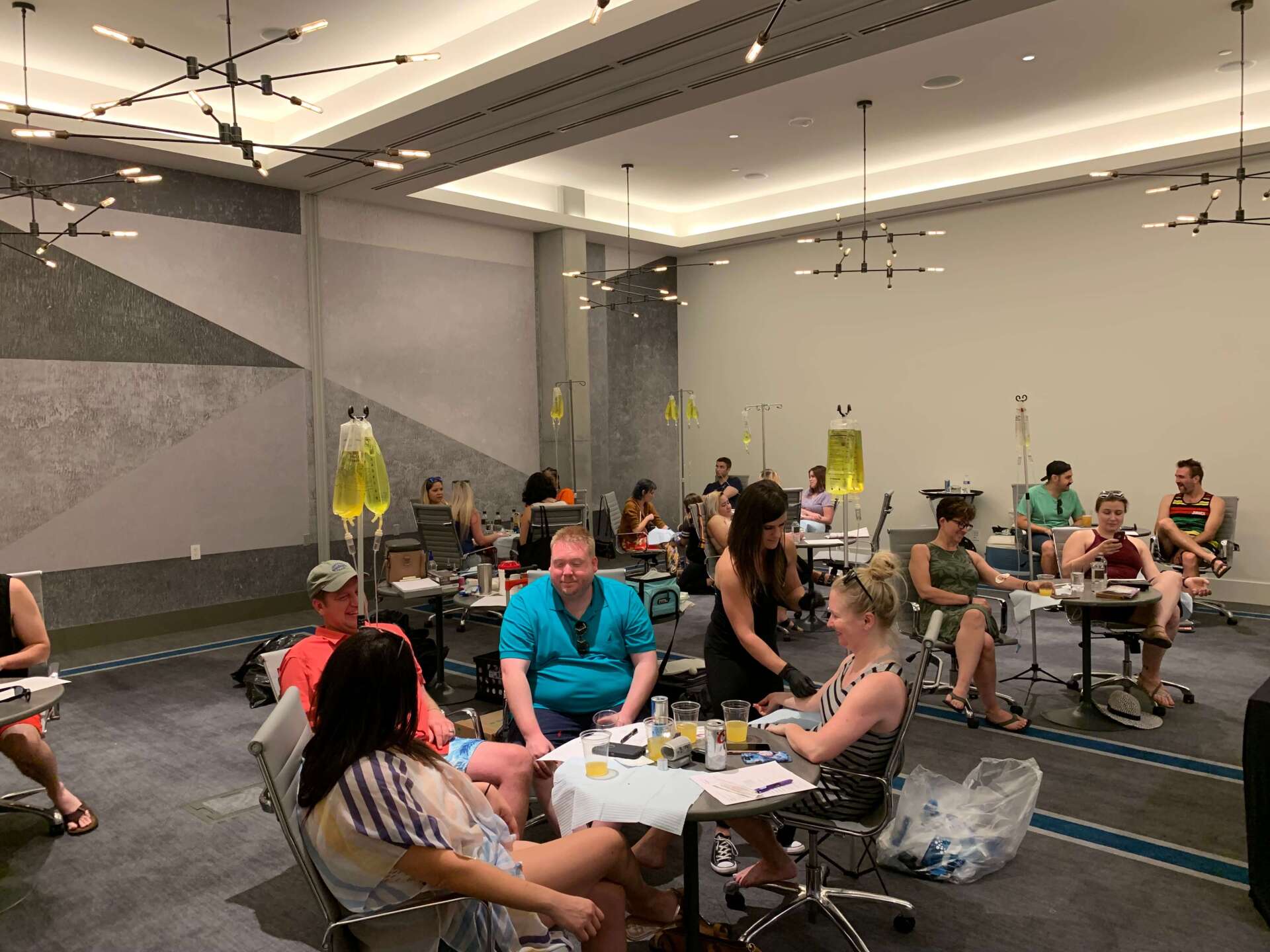RANKED #1 MOBILE IV SERVICES IN COLORADO
CALL US NOW! (720) 575-0973
Dehydration 101

Dehydration occurs when there is not enough water in your body. Drinking before you get thirsty is the best way to prevent dehydration. You're already mildly dehydrated if you're thirsty, and that can result in headaches, fatigue, dizziness, and more. In extreme cases like heatstroke, dehydration can be fatal.
The average American does not drink enough fluids to function optimally. The majority of Americans suffer from chronic dehydration. Dehydration can cause headaches and fatigue among other uncomfortable symptoms. It may even be life-threatening if left untreated. The good news is that dehydration can easily be reversed.
It helps to first understand what dehydration is and how it works in order to combat it. Check out the facts about dehydration, and learn some tips for rehydrating.
What Is Dehydration?
Have you ever been bedridden due to a cold or flu? Did you consume too much alcohol last night? Most people get dehydrated at some point.
Dehydration occurs when more liquids are lost than ingested. Fluid loss can occur for many reasons. 60% of the adult human body consists of water, so it's no wonder dehydration makes us sluggish.
It's not uncommon for us to be dehydrated without even realizing it. Some people may not even notice mild dehydration. On the other hand, severe dehydration is enough to make someone feel ill. Dehydration in any form is not healthy or beneficial to your body.
What Causes Dehydration?

It is natural for your body to lose water every day. A major cause of daily water loss is urination, caused by the kidneys removing waste. You also lose water when you sweat, breathe, and create saliva. The following is an overview of how much water adults lose naturally each day:
- Breathing: Have you ever used the moisture from your breath to clean a pair of glasses? Water vapor is contained in our breath, so we lose water when we breathe. Each time you exhale, your body moistens your lungs by releasing water vapor. Breathing alone causes you to lose about a cup of water a day.
- Sweating: The body loses water through sweating every day, whether or not it exercises. Resting in a cool room could result in you losing about two cups of water each day.
- Waste elimination: If you consume a varied diet, you will lose about 3 1/2 cups of water a day through feces and urine. Depending on what you eat and drink, you may lose more or less water.
Water loss is increased under certain conditions, such as working out in the heat. Dehydration occurs when you cannot replace the water you lose. The following conditions make you lose more water:
- Diarrhea and vomiting: Diarrhea alone can cause significant amounts of fluid loss, and even more if accompanied by vomiting. Children and the elderly are more likely to become dehydrated due to diarrhea and vomiting. Furthermore, children may not be able to tell you when they're thirsty or get themselves a drink. It is also possible that elderly people with limited mobility cannot drink enough water to rehydrate.
- Excessive sweating: You lose water when you sweat. When you sweat, you will become dehydrated if you do not drink enough fluids. People with outdoor jobs or who exercise outside are especially at risk - especially if it's hot and humid. Your body temperature increases and you need more fluids when it is humid since sweat can't evaporate and cool you down. Depending on the temperature and intensity, you can lose over a quart of water during an hour of exercise.
- Fever and illness: Do you remember the last time you were sick and not in the mood to drink? With an upset stomach or sore throat, it may be difficult to drink enough liquids, but you should consume watery foods like Jell-O or soup, particularly if you have a fever. You must drink more fluids if you are experiencing a rise in body temperature.
- Increased urination: Certain medications and diuretics, such as caffeine and alcohol, can cause increased urination and fluid loss. Diabetes, when left untreated, can cause frequent urination and greater fluid loss, which may result in dehydration.
What Are the Symptoms of Dehydration?
A person of any age can become dehydrated if their fluid intake is not replaced. If someone does not drink anything while participating in sports or a road race during hot weather, they may become dehydrated quickly, and may even experience heatstroke. It is possible to feel ill with as little as 1% to 2% loss of body weight due to mild dehydration.

Thirst is the first sign of dehydration. If you find yourself rushing to the sink or the refrigerator to grab a drink, you're already dehydrated. Dehydration also causes the following symptoms:
- Dry mouth
- Reduced need to urinate
- Dark yellow or amber-colored urine
- Dry skin
- Headache
- Muscle cramps
- Bad breath
- Constipation
- Hunger
You'll become severely dehydrated if you don't pay attention to your body's need to rehydrate. The following symptoms may occur with severe dehydration:
- Light-headedness
- Fainting
- Lack of urination
- Extremely dry skin
- Dizziness
- Rapid heartbeat and breathing
- Sunken eyes
- Confusion
- Irritability
- Fatigue
Children who are dehydrated may not be able to produce tears or urine. Anyone who is severely dehydrated needs medical attention right away.

How Can You Tell If You Are Dehydrated?
Would you like to know whether or not you should increase your fluid intake? Mild dehydration can be difficult to detect. However, there are a number of simple ways to determine if you're severely dehydrated. Here are some quick ways to check for dehydration that you can do almost anywhere.
The Skin Elasticity Test
Water makes up a large portion of your body's cells. Water accounts for 64% of the content of your skin. When you are dehydrated, you can tell by the appearance of your skin. Some of the signs include:
- Redness
- Cracking
- Clamminess
- Tightening
- Roughness
You can also test the elasticity of your skin. Follow these steps:
- Pinch about an inch of skin between your thumb and middle finger with two fingers.
- Hold it for about three seconds - it may be uncomfortable, but it shouldn't hurt.
- Watch your skin return to its original position as you let go.
How long did it take to complete the process? The longer it takes, the more dehydrated you become. A properly hydrated skin system will immediately return to normal.
This test comes with a caveat. Regardless of how hydrated you are, your skin will lose its elasticity as you age.
The Nail Test
Those who paint their nails might not be able to do the nail test. If you're in the middle of a color change, it's a good idea to test for dehydration. To do so, follow these steps:
- Place your testing hand above your heart.
- You should press your nail until it loses color.
- Let go of the nail.
- Count the time it takes for your nail to turn pink again.
A white spot appears on your nail when you press on it. This is caused by blood leaking from your nail. It usually returns within a few seconds. It may take longer if you are dehydrated.
The Pee Test
How well do you know all the yellow shades? Are you thinking sunshine yellow, hay bale yellow, amber, honey, or even chartreuse? You don't have to name the actual color. To determine your hydration levels, all you need to know is lighter and darker. Hydrated pee should still be yellow, but it should be more of a pastel yellow like you see in a nursery or at Easter. It shouldn't be clear - overhydration is also a thing to consider.

When your pee becomes darker than lemonade, you are dehydrated. You need fluids immediately if it starts to look like apple juice or honey, instead of lemonade. If it's even darker than apple juice or is bloody or red, please go to an urgent care center or call your physician.

Thirst is an unpleasant sensation. The body is telling you to drink more water. If you're worried about dehydration, know that there are ways to prevent it. To prevent dehydration, follow these tips:
- Don't wait until you're thirsty before drinking: You'll already be dehydrated by then. Drink plenty of fluids throughout the day, every day. Make it a habit to drink beverages throughout the day instead of only during meals. If you don't like plain water, that's fine. Just about anything counts. It's important to remember that some drinks are diuretics, such as beer, soda, coffee, or tea can cause you to go to the bathroom more frequently, so you'll need to replace the lost fluid.
- Drink more when working or exercising outside: If you work or exercise outside, you have to drink more than someone who stays indoors. An individual working outside in hot weather should drink five to seven ounces of cool water every 15 minutes or so. If you're indoors or outdoors, drink plenty of fluids before, during, and after strenuous exercise. If you're an athlete, rehydration, including electrolytes, should be part of your athletic recovery.
- Avoid alcohol and caffeine: You may not be able to resist happy hour every now and then. It can also feel impossible to get through the morning without a cup of coffee or two. If you are attending a friend's wedding, keep in mind that alcohol and caffeinated beverages, such as soda and coffee, will cause more urine output as well as fluid loss. Compared to non-alcoholic drinks, you can eliminate up to four times as much liquid for every alcoholic drink. Whenever you consume an alcoholic beverage, drink a glass of water.
- Keep cool: Staying cool and avoiding excessive sweating are ways to prevent dehydration. If you work or exercise outside, wear a light-colored layer of clothing. As soon as possible, change into dry, clean clothing if your clothing becomes too wet. Keep yourself hydrated by taking breaks in the shade.
- Take water with you: Refillable water bottles are a must when leaving the house, so you can stay hydrated at work, school, or while shopping. The goal is to finish the water before you get home at different points during the day. When you accomplish that, you'll feel great.
- Work out of direct sunlight: Are you aware that you can get dehydrated in the sun even if you do nothing at all? While you are in direct sunlight, your body works hard to keep you cool, and you might sweat more as a result. Imagine what it's like to work when you're dehydrated simply from sitting in the sun. It is a good idea to work outside in the early morning or late afternoon on a sunny day to prevent dehydration. Sunlight is strongest between 10 a.m. to 2 p.m., so if possible, avoid those times.
- Drink more fluids if you're sick: Make sure to drink more fluids when you have a cold, the flu, or any other illness. You should drink more fluids if you are vomiting or experiencing diarrhea to replace lost fluids, and don't wait until you are dehydrated. Try drinking a cup of decaffeinated tea or warm broth if your throat is sore. You can also stay hydrated with ice pops or ice chips when you feel too sick to move.
- Eat foods that are high in water: Staying hydrated tastes good, did you know? All you need to do is increase your intake of water-rich fruits and vegetables. Most fruits and vegetables contain a significant amount of water, such as watermelon, strawberries, and cucumber.
- Identify your risk level: While anyone can become dehydrated, certain people are more vulnerable than others, such as children, infants, and the elderly. Outdoor workers and athletes are also at higher risk of dehydration. Dehydration in babies must be treated immediately if any signs are present. People with dementia may be on medications that make them more prone to dehydration, so they need easy access to fluids.
- Keep electrolytes in mind: Dehydration cannot always be treated with water alone. For rehydration and electrolyte balance, additional fluids may be necessary if you plan on sweating a lot or exercising for over an hour. Minerals called electrolytes in the body help the brain, heart, and muscles function properly. These minerals are found in the blood, urine, tissues, and other body fluids. You get electrolytes from the foods and beverages you eat and drink, like sodium, potassium, magnesium, and calcium. You can replenish your electrolytes with low-sugar sports drinks during and after vigorous exercises. Children and infants can restore electrolyte balance with drinks like Pedialyte.
- Drink first thing:
Refrain from reaching for the coffee maker as soon as you open your eyes. Drink a glass of water first to rehydrate yourself. You're going to wake up dehydrated and thirsty after sleeping for eight hours. Set yourself up for success by avoiding dehydration before you begin your day.
How Much Water Should You Be Drinking?
Most of us have heard that we should drink eight glasses of water every day. However, this is just a general recommendation. We were taught that 64 ounces of water a day is sufficient only if you weigh 125 pounds or less. The
National Center for Health Statistics indicates that the average adult American male weighs 198 pounds, while the average adult female weighs 170 pounds. Weight is not the only factor that affects how much fluid you need to drink; your activity level is also important. In most cases, eight glasses a day is not enough. What's the proper amount, then?

Take your body weight and divide it by half. This is roughly how much water you should drink per day, in ounces. Exercise and sweating outdoors require that you drink twice as much fluid as you normally do. Knowing that, do you even get close to getting the necessary amount of water each day? For example, if you weigh 180 pounds, you should drink 90 ounces of water per day. Don't hesitate to ask your doctor if you're not sure whether you should drink enough water every day.
How Does Dehydration Affect Your Body?
Even mild dehydration can make you feel nauseous. What's happening to your body when it wants water? The first step in understanding what happens when you're dehydrated is to understand how your body interacts with water. In order to give you an idea of the importance of drinking water, consider the following:
- Water makes up 73% of the brain and heart.
- Water makes up about 83% of the lungs.
- Water makes up 79% of the kidneys and muscles.
- Water makes up 64% of the skin.
- Water makes up 31% of the bones.
What does all this data mean? Water makes up most of your body. Your body needs water to:
- Create saliva.
- Maintain a healthy body temperature.
- Metabolism and transport of nutritional elements from food to the body.
- Dispose of waste.
- Shock absorption.
- Lubricate the joints.
- Circulate oxygen throughout the body
- Generate new cells

Your body needs water because it dissolves many substances that make important nutrients and minerals available to your cells and allow for chemical reactions. The "sticky" surface of water helps transport proteins and carbohydrates your body uses as food and eliminates waste. When you drink water, your digestive tract absorbs it for use by your body.
Electrolytes come to mind. Your body dissolves electrolytes in water, and the two work together to keep you healthy. To illustrate, can you recall a time when you ate too much sodium, perhaps from a salty snack? Were you thirsty afterward? That's because you had too much sodium in your body. So, your brain sent signals that caused you to feel thirsty so you reached for a drink. Hydration helps restore electrolytes to the body.
It is amazing how your body works. To keep it healthy, you need to stay hydrated. If you go without drinking for an extended period of time or lose access to water, you'll likely experience the following stages of dehydration:
- Thirst: Having a thirst sensation is caused by the stimulation of nerves in your brain. Your thirst increases as you need more water. Basically, your body is telling you to drink.
- Conservation of water: In order for your kidneys to conserve water, your pituitary gland secretes vasopressin, an antidiuretic hormone. You'll therefore urinate less.
- Muscle cramps: The more dehydration you experience, the more water escapes your cells and enters your bloodstream. The result is symptoms such as dizziness, dry mouth, and muscle cramps.
- An increase in heart rate: Dehydration and electrolyte imbalance caused by moderate dehydration can cause palpitations, heart palpitations, decreased sweating, and hypotension if not treated. If you stay dehydrated for a long time, your blood will become thicker and more concentrated. As a result, your heart has a harder time pumping blood through your muscles and blood vessels.
Dehydration progresses rapidly if left untreated. If you don't rehydrate, you may experience delirium, confusion, seizures, shock, and, ultimately, organ damage.
What To Do If You're Dehydrated
In order to treat dehydration, you should replace the fluids and electrolytes you lost. You or your doctor will determine the best treatment method based on the severity and cause of your dehydration. Children and infants who are dehydrated after vomiting or diarrhea might take an over-the-counter rehydration solution, while older children can drink diluted sports drinks. People suffering from mild dehydration due to illness or drinking too much alcohol can feel better by drinking fluids.
It is possible to make a home remedy for mild dehydration if you do not want to run to the grocery store for sports drinks. If you have a few basic ingredients on hand, you can make your own rehydration solution at home:
- 5 cups of water and 6 teaspoons of sugar should be mixed with 1/2 teaspoon of salt.
- Don't use too much salt and make sure your teaspoons are level.
Large children and adults can drink the solution until they feel better. Add a half cup of orange juice or mashed banana if you want to improve the taste. When you're severely dehydrated, you should seek immediate medical attention. Dehydration IVs are required in severe cases and sometimes in moderate cases. Fluids and salts are infused directly into a vein during intravenous rehydration. The result is a fast and effective recovery.

The majority of Americans are chronically dehydrated. As the majority, there's no reason to panic - there are options available to you. In order to prevent dehydration from becoming dangerous, you must treat it as soon as possible.
Feel Better Faster With Mobile IV Colorado
Mobile IV Colorado provides fast, easy, and reliable home IV services. Our IV treatments can relieve headaches, hangovers, the flu, and many other ailments in the comfort of your home.
Symptoms of dehydration can include vomiting and diarrhea. You can use IV fluids for dehydration to replace fluids and electrolytes in these situations. Our mobile IV services are the fastest way to hydrate to increase your energy and manage any symptoms.
Let our experts at Mobile IV Colorado help you if you're experiencing symptoms of dehydration. We are committed to helping you get healthy again as quickly as possible (without needing to leave your home). We will dispatch a team of clinical professionals to diagnose your problem quickly, administer an IV if necessary, and provide full relief as soon as possible.
Mobile IV hydration treatments generally cost the same as those provided at urgent care centers, or even less than those provided in emergency rooms. Mobile IV therapy Denver Colorado's mission is to help you feel better as soon as possible.
Our Myers' Cocktail is a great option for those looking for hydration. A nutrient-rich mixture can provide your body with a dose of vitamins and nutrients while reducing stress, improving your mood, and increasing your energy. Depending on your symptoms, an IV treatment can be tailored to suit your needs.
Contact Mobile IV Colorado today to learn more about mobile IV therapy near me. Booking can be done
online or by calling
(720) 575-0973.
If you think you may have a medical emergency, immediately call your doctor or dial 911.
This website is not intended to provide medical advice. It is only for informational purposes. It is not aimed to be a substitute for professional medical advice, diagnosis, or treatment. Never seek treatment based on something you read on the internet and disregard professional medical advice. These statements have not been evaluated by the Food and Drug Administration.


© 2024 Mobile IV Colorado All rights reserved Powered By OMG Marketing



